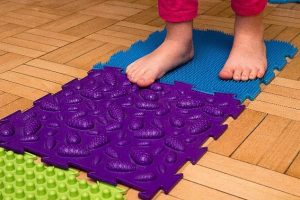Occupational Therapy
What is a Sensory Processing Disorder?
 A sensory processing disorder is a condition in which the brain has trouble receiving and responding to information that comes in through the senses. For kids who have difficulties processing sensory information, it can be very frustrating and confusing for them and can affect children in many ways. Here are a few skills that are often affected:
A sensory processing disorder is a condition in which the brain has trouble receiving and responding to information that comes in through the senses. For kids who have difficulties processing sensory information, it can be very frustrating and confusing for them and can affect children in many ways. Here are a few skills that are often affected:
- Motor Skills: Children can be under-responsive (hyposensitive) or under-responsive (hypersensitive) to sensory input (including hearing, touch, taste, smell, sight, and movement) from their environment. Kids who are hyposensitive, crave sensory input. They love jumping and crashing activities as well as deep pressure and “Bear hugs”. These kids are often in constant motion. Kids who are hypersensitive, may appear clumsy or sometimes fearful of some activities as they have difficulty understanding where their body is in relation to other objects. These kids often have difficulty with activities that require good balance such as climbing or riding a bike.
- Social Skills: Kids who are under-sensitive may feel anxious around others making socializing difficult. On the other hand, kids who are over-sensitive may play very rough and not realize it.
- Self Control: Children who experience sensory processing issues often feel anxious or stimulated and may have trouble controlling their impulses.
Signs of Sensory Processing Difficulties:

- Overly sensitive or under reactive to pain, touch, movement, sight, or sounds
- Unusually high or low activity level
- Poor attention to tasks
- Poor body awareness
- Coordination problems; appear clumsy or awkward
- Delays in speech and/or language development
- Immature social skills
- Impulsive or lack of self-control
- Difficulty calming self down
What To Do if You Suspect Your Child Has a Sensory Processing Disorder
- Consult with your child’s pediatrician. Talk with your child’s doctor about your concerns and your child’s symptoms. The doctor may be able to do a screening in the office or refer you to a specialist.
- Consult with a specialist. Many specialists (including us) offer free screenings. This is a good starting place to identify if there is an issue. If the screening results indicate that your child is at risk, a full comprehensive evaluation would most likely be recommended.
- Educate yourself. Parenting a child with a sensory processing disorder is not an easy task. Learning about how your child responds to sensory information around them can help to reduce frustration and tantrums. Being mindful of sensory stimuli in an environment being visited can make for a positive experience for all!
